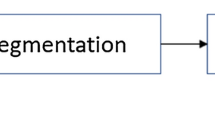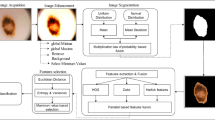Abstract
Melanoma cancer is the most fatal skin cancer that has been on rise in recent years. Early detection will increase the survival rate but it's challenging to detect. The severity of melanoma was usually diagnosed with invasive methods like biopsy. Alternatively, less time consuming and simplified methods were generated over time, yet a lot has to be improved. Researches proved that a computer aided automated skin cancer diagnosing method helps in processing the dermoscopic images in an efficient way. In this paper, image processing algorithms were used to decompose and fragment the original dermoscopic image and classify the lesion as melanoma or benign. In the proposed method, we used a set of composite feature vectors and an Extreme Learning Machine (ELM) classifier to detect the melanoma in dermoscopic images. Experimental analysis is done by calculating the total dermoscopic score using the feature extraction method. A set of composite features is extracted and is given as an input to the ELM classifier along with the total dermoscopic score (TDS). The sensitivity and specificity obtained using TDS score is 91.67% and 82.22% respectively and using composite features with TDS is 94.52% and 93.18% respectively. The generated receiver operating curve (ROC) clearly shows that the accuracy is increased to 94.01% and the area under the curve (AUC) 0.956 which is close towards 1, proves that the proposed method is more accurate and effective.









Similar content being viewed by others
References
Almansour E, Jaffar MA (2016) Classification of dermoscopic skin cancer images using color and hybrid texture features. IJCSNS Int J Comput Sci Netw Secur 16(4):135–139
Ansari UB, Sarode T (2017) Skin cancer detection using image processing. Int Res J Eng Technol 4(4):2875–2881
Al Abbadi NK, Dahir NS, Al-Dhalimi MA et al (2010) Psoriasis detection using skin color and texture features. J Mob Multimed. https://doi.org/10.13052/jmm1550-4646.1829
Barata C, Ruela M, Francisco M, Mendonça T, Marques JS (2013) Two systems for the detection of melanomas in dermoscopy images using texture and color features. IEEE Syst J 8(3):965–979
Basheer S, Anbarasi M, Sakshi DG, Vinoth Kumar V (2020) Efficient text summarization method for blind people using text mining techniques. Int J Speech Technol 23:713–725. https://doi.org/10.1007/s10772-020-09712-z
Choudhury D, Naug A, Ghosh S et al (2015) Texture and color feature based WLS framework aided skin cancer classification using MSVM and ELM. In: 2015 Annual IEEE india conference (INDICON), pp 1–6 IEEE
Datar M, Padfield D, Cline H et al (2008) Color and texture based segmentation of molecular pathology images using HSOMs. In 2008 5th IEEE International symposium on biomedical imaging: from nano to macro, pp 292–295 IEEE
Dhiman G, Vinoth Kumar V, Kaur A, Sharma A (2021a) DON: deep learning and optimization-based framework for detection of novel coronavirus disease using X-ray images. Interdiscip Sci Comput Life Sci 13(2):260–272
Dhiman G, Vinoth Kumar V, Kaur A, Sharma A (2021b) DON: deep learning and optimization-based framework for detection of novel coronavirus disease using X-ray images. Interdiscip Sci Comput Life Sci 13:260–272
Ding X, Yang F, Ma F (2022) An efficient model selection for linear discriminant function-based recursive feature elimination. J Biomed Inform 129:104070
Gopinathan S, Rani SNA (2016) The melanoma skin cancer detection and feature extraction through image processing techniques. Orthopedics 5(11):2016
Jaleel JA, Salim S, Aswin RB et al (2012) Artificial neural network based detection of skin cancer. Int J Adv Res Electr Electron Instrum Eng 1(3)
Jana E, Subban R, Saraswathi S et al (2017) Research on skin cancer cell detection using image processing. In: 2017 IEEE International conference on computational intelligence and computing research (ICCIC), pp 1–8 IEEE
Jayalakshmi D, Dheeba J (2020) Border detection in skin lesion images using an improved clustering algorithm. Int J e-Collab (IJeC) 16(4):15–29
Jisha Gopinath, MJ (2015) Feature extraction by gabor filter and classification of skin lesion using support vector machine. Int J Innov Res Comput Commun Eng 3
Kouser RR, Manikandan T, Kumar VV (2018) Heart disease prediction system using artificial neural network, radial basis function and case based reasoning. J Comput Theor Nanosci 15:2810–2817
Kumar VV, Raghunath KK, Rajesh N, Venkatesan M, Joseph RB, Thillaiarasu N (2021) Paddy plant disease recognition, risk analysis, and classification using deep convolution Neuro-Fuzzy network. J Mob Multimed 23:325–348
Mahesh TR, Dhilip Kumar V, Vinoth Kumar V, Asghar J, Geman O, Arulkumaran G, Arun N (2022) AdaBoost ensemble methods using K-fold cross validation for survivability with the early detection of heart disease. Comput Intell Neurosci 2022:1–11. https://doi.org/10.1155/2022/9005278
Maurya R, Singh SK, Maurya AK, Kumar A (2014) GLCM and multi class support vector machine based automated skin cancer classification. In: 2014 International conference on computing for sustainable global development (INDIACom), pp 444–447 IEEE
Mehta P, Shah B (2016) Review on techniques and steps of computer aided skin cancer diagnosis. Procedia Comput Sci 85:309–316
Mete M, Sirakov NM (2014) Optimal set of features for accurate skin cancer diagnosis. In: 2014 IEEE International conference on image processing (ICIP), pp 2256–2260 IEEE
Murugan A, Nair SAH, Preethi AAP, Kumar KS (2021) Diagnosis of skin cancer using machine learning techniques. Microprocess Microsyst 81:103727
Nezhadian FK, Rashidi S (2017) Melanoma skin cancer detection using color and new texture features. In: 2017 Artificial intelligence and signal processing conference (AISP), pp 1–5 IEEE
Panigrahy R (2008) An improved algorithm finding nearest neighbor using kd-trees. Latin American symposium on theoretical informatics. Springer, Berlin, Heidelberg, pp 387–398
Pérez-Ortiz M, Sáez A, Sánchez-Monedero J, Gutiérrez PA, Hervás-Martínez C (2016) Tackling the ordinal and imbalance nature of a melanoma image classification problem. In: 2016 international joint conference on neural networks (IJCNN), pp 2156–2163 IEEE
Praveen Sundar PV, Ranjith D, Vinoth Kumar V et al (2020) Low power area efficient adaptive FIR filter for hearing aids using distributed arithmetic architecture. Int J Speech Technol 23:287–296. https://doi.org/10.1007/s10772-020-09686-y
Sánchez J, Monzón N, Salgado De La Nuez A (2018) An analysis and implementation of the harris corner detector. Image processing on line. Springer, Berlin, pp 287–387
Villar SA, Torcida S, Acosta GG (2017) Median filtering: a new insight. J Math Imaging Vision 58(1):130–146
Waheed Z, Waheed A, Zafar M, Riaz F et al (2017) An efficient machine learning approach for the detection of melanoma using dermoscopic images. In: 2017 International conference on communication, computing and digital systems (C-CODE), pp 316–319 IEEE
Wang J, Lu S, Wang SH, Zhang YD (2021) A review on extreme learning machine. Multimedia tools and application. IntechOpen, London, pp 1–50
Zaqout I (2019) Diagnosis of skin lesions based on dermoscopic images using image processing techniques. Pattern Recognit Sel Methods Appl 15:2810–2817
Funding
We didn’t receive any funding for this model development.
Author information
Authors and Affiliations
Corresponding author
Ethics declarations
Conflicts of interest
All authors whose names are listed in the manuscript have no conflicts of interest.
Human and animal rights
No animals or Humans are involved in this study.
Informed consent
The dataset collected was from a public repository and there is no health care organization involved.
Additional information
Publisher's Note
Springer Nature remains neutral with regard to jurisdictional claims in published maps and institutional affiliations.
Rights and permissions
Springer Nature or its licensor holds exclusive rights to this article under a publishing agreement with the author(s) or other rightsholder(s); author self-archiving of the accepted manuscript version of this article is solely governed by the terms of such publishing agreement and applicable law.
About this article
Cite this article
Jayalakshmi, D., Dheeba, J. Computer aided diagnostic support system for skin cancer using ELM classifier. Int J Syst Assur Eng Manag 15, 449–461 (2024). https://doi.org/10.1007/s13198-022-01775-2
Received:
Revised:
Accepted:
Published:
Issue Date:
DOI: https://doi.org/10.1007/s13198-022-01775-2





